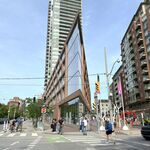I think that this failed MMP campaign should be followed up with a move to introduce a new system that is not as dramatic a change, is easily understood by anybody, and would bring about many of the same benefits without most of the drawbacks: preferential balloting.
I would certainly be open to that, but I think the sense is that the issue is dead for quite a while. The Star even said first-past-the-post is "not broken" in a recent editorial, which I think most could find fault with, no matter their views on MMP, which I will admit has faults.
I'd like to propose my complex alternative to MMP that is based on a regional proportional system that addresses criticisms about geographic representation and party lists somewhat.
It's a local/regional rep system, where similar to MMP, you vote twice, and for every 10 ridings or so, 2-3 seats per 10 ridings are allocated to bring the regional representation closer to the actual vote. The regional perty list members would be drawn from the riding candidates, so at least there's some local input. If a party has a strong candidate, but lives in a riding with low support for that party, then that candidate could go to the top of the regional list - I guess the party, or the collection of local riding associations could determine the rankings.
I figure there would be 9 regions, with Toronto, due to its size (22.5 ridings versus 10-11 for others), getting 5 or 6 reps, the others getting 3 reps.
There would be 29 more seats if the number of ridings stayed the same. If the riding numbers were to drop a bit, I could see 8 regions with 3 reps each, except Toronto, with 5. One could even up the regional representation quickly to deal with fast growth, like K-W or Peel or York.
Toronto (23 ridings, 5 regional seats)
Peel-Halton (11 ridings, 3 regional seats)
York-Durham-Northumberland-Victoria (12 ridings, 3 regional seats)
etc.
For example, say Peel-Halton-Dufferin has 11 local ridings, and 9 go Liberal 2 go PC. The Liberals get 45% of the popular vote. The Tories get 30%, the NDP 15%, other 10%. The PCs would be entitled to 2 more seats, the NDP would grab a seat, and be the NDP rep for Peel-Dufferin.
Toronto, with 23 (really 22.5) ridings right now, would be entitled to 5 additional members. With 19 (83% of seats) Liberals and 4 NDP (17% of seats) candidates, no others. The Liberals got 45%, PC 25%, NDP 21%, Greens 8% of popular vote in the 23 ridings. The PCs would be entitled to 4 seats (and John Tory would get a seat in this scenerio), and the Greens 1 (giving a seat to Frank De Jong, running in Davenport as well, but losing the local vote to Mr. Burns, I mean Mr. Ruprecht).
So Toronto would go from 19-0-4-0 to 19-4-4-1. The Liberals would still have a 67% majority of the seats (despite getting 45% of the vote), but it would be less lopsided. City Hall would be rid of David Shiner (who would presumably be second or third on the Toronto list), and all four party leaders would be in Queen's Park.
The NDP would end up with 18 out of 136 seats, Liberals would get 75, Conservatives 39 perhaps, Greens 4. There would still be a Liberal majority (albeit smaller - 57% of seats instead of 66%), all other factors remaining the same.
I figure McGuinty would still have a majority under this system, but much less. The Greens would probably have 2-3 seats (Toronto, one in a hypothetical West-Central "region" where they came close in Bruce-Grey-Owen Sound, maybe one in Ottawa "region")




